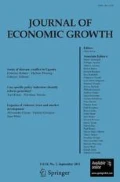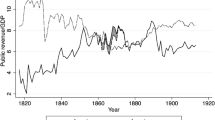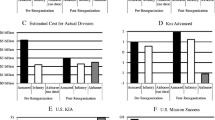Abstract
We exploit differences in casualties sustained in pre-modern wars to estimate the impact of fiscal capacity on economic performance. In the past, states fought different amounts of external conflicts, of various lengths and magnitudes. To raise the revenues to wage wars, states made fiscal innovations, which persisted and helped to shape current fiscal institutions. Economic historians claim that greater fiscal capacity was the key long-run institutional change brought about by historical conflicts. Using casualties sustained in pre-modern wars to instrument for current fiscal institutions, we estimate substantial impacts of fiscal capacity on GDP per worker. The results are robust to a broad range of specifications, controls, and sub-samples.
Similar content being viewed by others
References
Acemoglu D. (2005) Politics and economics in weak and strong states. Journal of Monetary Economics 52: 1199–1226
Cantoni D., Johnson S., Robinson J. (2011b) The Consequences of radical reform: The French revolution. American Economic Review 101: 3286–3307
Acemoglu D., Johnson S., Robinson J. (2001) Colonial origins of comparative development: An empirical investigation. American Economic Review 91: 1369–1401
Acemoglu D., Johnson S., Robinson J. (2002) Reversal of fortune: Geography and development in the making of the modern world income distribution. Quarterly Journal of Economics 117: 1231–1294
Acemoglu D., Johnson S., Robinson J. (2005) The rise of Europe: Atlantic trade, institutional change, and economic growth. American Economic Review 94: 546–579
Acemoglu D., Robinson J., Verdier T. (2004) Alfred Marshall lecture—Kleptocracy and divide-and-rule: A model of personal rule. Journal of the European Economic Association 2: 162–192
Acemoglu D., Ticchi D., Vindigni A. (2011a) Emergence and persistence of inefficient states. Journal of the European Economic Association 9: 177–208
Aidt T., Jensen P. (2009) The taxman tools up: An event history study of the introduction of the personal income tax, 1815–1938. Journal of Public Economics 93: 160–175
Alesina A., Devleeschauwer A., Easterly W., Kurlat S., Wacziarg R. (2002) Fractionalization. Journal of Economic Growth 8: 155–194
Ashraf Q., Galor O. (2011) Dynamics and stagnation in the Malthusian epoch. American Economic Review 101: 2003–2041
Ashraf, Q., & Galor, O. (2012). The ‘out of Africa’ hypothesis, human genetic diversity, and comparative economic development. American Economic Review, forthcoming.
Bates R. (2001) Prosperity and violence. Norton, New York
Beber, B. (2009). The effects of international mediation on war settlement: An instrumental variables approach. Mimeo, New York University.
Besley T., Persson T. (2008) Wars and state capacity. Journal of the European Economic Association 2: 522–530
Besley T., Persson T. (2009) The origins of state capacity: Property rights, taxation, and politics. American Economic Review 99: 1218–1244
Besley T., Persson T. (2010) State capacity, conflict, and development. Econometrica 78: 1–34
Besley T., Persson T. (2011) Pillars of prosperity. Princeton University Press, Princeton, NJ
Bockstette V., Chanda A., Putterman L. (2002) States and markets: The advantage of an early start. Journal of Economic Growth 7: 347–369
Brennan G., Buchanan J. (1980) The power to tax. Cambridge University Press, Cambridge
Brewer J. (1989) The sinews of power. Unwin Hyman, London
Cardoso J., Lains P. (2010) Paying for the liberal state. Cambridge University Press, Cambridge
Centeno M. (1997) Blood and debt: War and taxation in nineteenth-century Latin America. American Journal of Sociology 102: 1565–1605
Central Intelligence Agency. (2009). The CIA World Factbook. https://www.cia.gov/library/publications/the-world-factbook/.
Chanda A., Putterman L. (2007) Early starts, reversals, and catch-up in the process of economic development. Scandinavian Journal of Economics 109: 387–413
Clodfelter M. (2002) Warfare and armed conflicts: A statistical reference, 1500–2000. McFarland, Jefferson
Comin D., Easterly W., Gong E. (2010) Was the wealth of nations determined in 1000 BC?. American Economic Journal: Macroeconomics 2: 65–97
Conley T., Hansen C., Rossi P. (2012) Plausibly exogenous. Review of Economics and Statistics 94: 260–272
Cox G. (2011) War, moral hazard, and ministerial responsibility: England after the glorious revolution. Journal of Economic History 71: 133–161
De Long J. B., Shleifer A. (1993) Princes and merchants: European city growth before the industrial revolution. Journal of Law and Economics 36: 671–702
Diamond J. (1997) Guns, germs, and steel. Norton, New York
Dincecco M. (2009) Fiscal centralization, limited government, and public revenues in Europe, 1650–1913. Journal of Economic History 69: 48–103
Dincecco M. (2011) Political transformations and public finances. Cambridge University Press, Cambridge
Dincecco M., Federico G., Vindigni A. (2011) Warfare, taxation, and political change: Evidence from the Italian Risorgimento. Journal of Economic History 71: 887–914
Engerman S., Sokoloff K. (1997) Factor endowments, institutions, and differential paths of growth among new world economies. In: Haber S. (ed) How Latin America fell behind. Stanford University Press, Palo Alto, CA
Ferguson N. (2006) Political risk and the international bond market between the 1848 Revolution and the Outbreak of the First World War. Economic History Review 59: 70–112
Frankel J., Romer D. (1999) Does trade cause growth?. American Economic Review 89: 379–399
Galor O., Moav O., Vollrath D. (2009) Inequality in land ownership, the emergence of human capital promoting institutions, and the great divergence. Review of Economic Studies 76: 143–179
Galor O., Weil D. (1999) From Malthusian stagnation to modern growth. American Economic Review 89: 150–154
Galor O., Weil D. (2000) Population, technology and growth: From Malthusian stagnation to the demographic transition and beyond. American Economic Review 90: 806–828
Gerschenkron A. (1966) Economic backwardness in historical perspective. Belknap Press, Cambridge, MA
Glaeser E., La Porta R., Lopez-de-Silanes F., Shleifer A. (2004) Do institutions cause growth?. Journal of Economic Growth 9: 271–303
Guiso L., Sapienza P., Zingales L. (2009) Cultural biases in economic exchange?. Quarterly Journal of Economics 124: 83–116
Hall R., Jones C. (1999) Why do some countries produce so much more output per worker than others?. Quarterly Journal of Economics 114: 83–116
Herbst J. (2000) States and power in Africa. Princeton University Press, Princeton, NJ
Heston, A., Summers, R., & Aten, B. (2006). Penn world tables, Version 6.2. Philadelphia: Center for International Comparisons of Production, Income and Prices, University of Pennsylvania.
Hines J., Summers L. (2009) How globalization affects tax design. Tax Policy and the Economy 23: 123–158
Hoffman, P. (2009). Why was it that Europeans conquered the world? Mimeo, California Institute of Technology.
Hoffman P., Rosenthal J. L. (1997) The political economy of warfare and taxation in early modern Europe: historical lessons for economic development. In: Drobak J., Nye J. (eds) The frontiers of the new institutional economics. Academic Press, St. Louis, MO
Hoffman, P., & Rosenthal, J. L. (2000). Divided we fall: The political economy of warfare and taxation. Mimeo, California Institute of Technology.
International Monetary Fund Staff. (2009). Government Financial Statistics. www.imf.org/external/data.htm.
Jaggers, K., & Marshall, M. (2000). Polity IV Project: Political regime characteristics and transitions, 1800–2007. Fairfax, VA: Center for Systematic Peace, George Mason University.
Kang D. (2002) Crony capitalism: Corruption and development in South Korea and the Philippines. Cambridge University Press, Cambridge
Keegan J. (1994) A history of warfare. Vintage, London
Klein Goldewijk K., Beusen A., de Vos M., van Drecht G. (2010) The HYDE 3.1 spatially explicit database of human-induced land use change over the past 12,000 years. Global Ecology and Biogeography 20(1): 73–86
Knack S., Keefer P. (1995) Institutions and economic performance: Cross-country tests using alternative measures. Economics & Politics 7: 207–227
La Porta R., Lopez-de-Silanes F., Shleifer A., Vishny R. (1998) Law and finance. Journal of Political Economy 106: 1123–1155
Levi M. (1988) Of rule and revenue. University of California Press, Berkeley, CA
Lindert P. (2004) Growing public. Cambridge University Press, Cambridge
Magnusson L. (2009) Nation, state, and the industrial revolution. Routledge, London
Migdal J. (1988) Strong societies and weak states. Princeton University Press, Princeton, NJ
Mokyr J. (1998) The second industrial revolution, 1870–1914. In: Castronono V. (ed) Storia dell’economia Mondiale. Laterza, Rome
Mokyr J. (1999) The British industrial revolution. Westview, Boulder
North D. (1981) Structure and change in economic history. Norton, New York
Nunn N. (2008) The long term effects of Africa’s Slave Trades. Quarterly Journal of Economics 123: 139–176
Nunn N. (2009) The importance of history for economic development. Annual Review of Economics 1: 65–92
O’Brien P. (2011a) The nature and historical evolution of an exceptional fiscal state and its possible significant for the precocious commercialization and industrialization of the British Economy from Cromwell to Nelson. Economic History Review 64: 408–446
O’Brien, P. (2011b). The contributions of warfare with revolutionary and Napoleonic France to the consolidation and progress of the British Industrial Revolution. Working Paper 150/11, London School of Economics.
Ohanian L., Raffor A., Rogerson R. (2008) Long-term changes in labor supply and taxes: Evidence from OECD countries, 1956–2004. Journal of Monetary Economics 55: 1353–1362
Persson T., Tabellini G. (2000) Political economics. MIT Press, Cambridge, MA
Persson T., Tabellini G. (2003) The economic effects of constitutions. MIT Press, Cambridge, MA
Prescott E. (2004) Why do Americans work so much more than Europeans?. Federal Reserve Bank of Minneapolis Quarterly Review 28: 2–13
Putterman, L. (2006). Agricultural transition year country data set. Mimeo, Brown University.
Putterman, L. (2007). State antiquity index, version 3. Mimeo, Brown University.
Putterman L., Weil D. (2010) Post-1500 population flows and the long run determinants of economic growth and inequality. Quarterly Journal of Economics 125: 1627–1682
Rodrik D. (1998) Why do more open economies have bigger governments?. Journal of Political Economy 106: 997–1032
Roland, G. (2010). The long-run weight of communism or the weight of long-run history? Working Paper 2010/83, United Nations University.
Rosenthal J. L., Wong R. B. (2011) Before and beyond divergence. Harvard University Press, Cambridge, MA
Sarkees M. (2000) The correlates of war data on war: An update to 1997. Conflict Management and Peace Science 18: 123–144
Scheve K., Stasavage D. (2010) The conscription of wealth: Mass warfare and the demand for progressive taxation. International Organization 64: 529–561
Scheve K., Stasavage D. (2012) Democracy, war, and wealth: Evidence of two centuries of inheritance taxation. American Political Science Review 106: 81–102
Tilly C. (1990) Coercion, capital, and European states, 990–1990. Blackwell, Cambridge
Wade R. (1990) Governing the market. Princeton University Press, Princeton, NJ
Wittfogel K. (1957) Oriental despotism. Yale University Press, New Haven, CT
World Bank Staff. (2011). World Development Indicators www.data.worldbank.org/indicator.
World Values Survey Association. (2009). World Values Survey, 1981–2008. www.worldvaluessurvey.org/.
Author information
Authors and Affiliations
Corresponding author
Rights and permissions
About this article
Cite this article
Dincecco, M., Prado, M. Warfare, fiscal capacity, and performance. J Econ Growth 17, 171–203 (2012). https://doi.org/10.1007/s10887-012-9079-4
Published:
Issue Date:
DOI: https://doi.org/10.1007/s10887-012-9079-4




